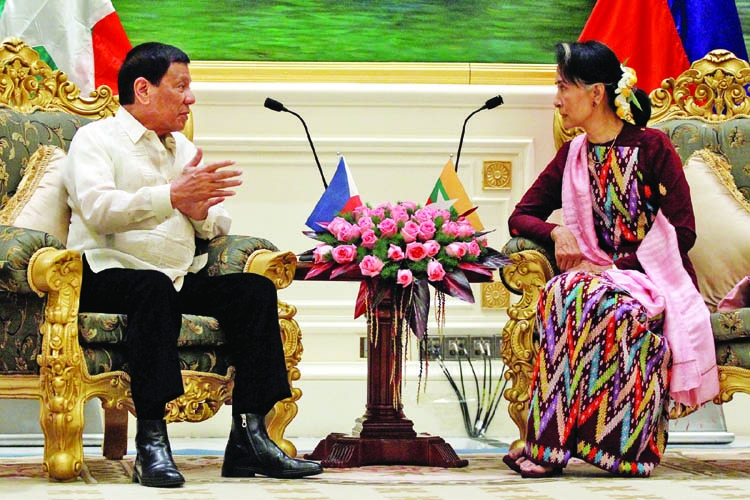Published: 12:48 AM, 22 March 2017
Duterte meets Suu Kyi
 Philippines President Rodrigo Duterte (L) is welcomed by Myanmar's leader Aung San Suu Kyi in Yangon, Myanmar on Monday. -Reuters
Philippines President Rodrigo Duterte (L) is welcomed by Myanmar's leader Aung San Suu Kyi in Yangon, Myanmar on Monday. -Reuters Regional politics makes for strange bedfellows, and at first glance, it is hard to imagine more of an odd couple than tempestuous Philippine President Rodrigo Duterte and his cerebral de facto Myanmar counterpart, State Counselor Aung San Suu Kyi, who met Monday in Myanmar's capital, Naypyitaw. After his arrival in Myanmar on Sunday, Duterte rejected European criticism of his deadly war on drugs with his usual profanity, insisting that "more people will die."
"I said I will not stop," he declared. "I will continue until the last drug lord in the Philippines is killed and the pushers out of the streets." Suu Kyi has just as little time for critics, but her crisp Oxford-accented speech is more like a dagger to her guest's blunderbuss. The Philippines' hard man thrives on press coverage, while Myanmar's leader barely conceals her contempt for the media. She is the ice to Duterte's fire.
The main purpose of Duterte's visit to Myanmar is to complete visits to nine fellow members of the Association of Southeast Asian Nations, or ASEAN, which the Philippines is helming this year. While their meeting is said to have included the usual pro forma talk about trade and investment, it had a tangible result when Duterte promised $300,000 in humanitarian aid for Myanmar's Rakhine state, where communal conflict has displaced more than 100,000 people, mostly Muslims, from their homes.
Suu Kyi's biggest problem is probably meeting the expectations of her supporters in Myanmar and abroad. Myanmar's economy lagged badly behind most of its neighbors after five decades of military rule.
Widespread prejudice against the country's Muslim Rohingya minority has led to deadly communal violence, posing a political threat to Suu Kyi while earning international opprobrium.
Other minorities are restive, seeking greater political autonomy promised since the nation became independent in 1948. All the while, provisions in the military-drafted constitution restrict Suu Kyi's ability to make any reforms affecting the army's considerable influence.
While seen as a tough and unorthodox leader who could break through an anemic bureaucracy and tradition to spark radical reforms, he faces the same deep-seated problems that have stymied his predecessors.
-AP, Naypyitaw




